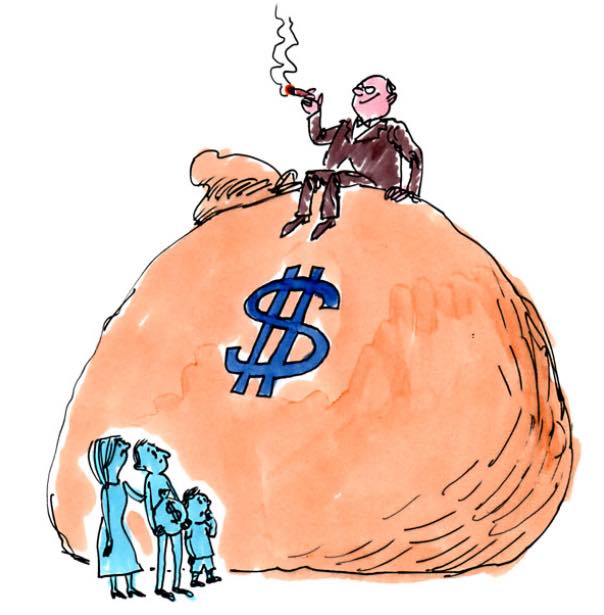QAnon and other conspiracy theories may only be a symptom of an underlying malaise. Though some relief might be gained by treating the symptoms, such as adding factcheck warnings to posts or banning advocates from certain platforms, in the long term, the underlying roots of the malaise must be addressed.

A sense of social exclusion is exacerbated by material and financial exclusion. It is a short journey from ‘I have poor access to resources’ through ‘it is unfair that I have poor access to resources’ to ‘who is grabbing all the resources and preventing my access to them?’.
Various studies also indicate a correlation between higher education and decreased likelihood that people believe in conspiracy theories. This connection has been explored by Professor Jan-Willem van Prooijen of the University of Amsterdam, who proposed three mediators of this relationship: belief in simple solutions for complex problems, feelings of powerlessness, and subjective social class. It is probable that in the long term, education is a vital key.

In 2010, I was introduced to the original ‘Zeitgeist’ movie by some friends who were very impressed by it and asked for my views. As I watched the movie it became clear to me that viewers were being asked to adopt a two-tier approach to critical thinking. I now wonder whether this may be a universal requirement for the success of conspiracy theories. We seem to preferentially apply our critical faculty to the deconstruction of a reported event or phenomenon, but then dispense with those critical faculties when constructing an alternative explanation. Destruction is easy to rationalise, reconstruction less so.
In Dr van Prooijen’s analysis, feelings of powerlessness are identified as being a driver of belief in conspiracy theories. Professor Cynthia Wang, Director of Northwestern University’s Kellogg School of Management in the US, along with others, found that feeling less in control caused a spike in conspiratorial thinking and that creating an increased sense of control provides an immunity to conspiracy perceptions. They achieved this through nudging participants in their studies toward adopting a goal-driven mindset and found that they could shift someone’s mindset so they see fewer conspiracies.

This makes sense if we understand that conspiracy theories thrive in an environment where a breakdown in myths and consensus reality leaves an inner vacuum devoid of a sense of purpose. In a culture where self-worth and validation are increasingly based on external factors such as peer approval and achieving societal goals of success, conspiracy theories will continue to gain traction and their appeal will grow.
Paradoxically, their adherents are vaccinated against rationality by the conviction that the reason no one knows about the conspiracy is because of the success of the conspiracy. If ‘evidence’ contradicts the theory, then the evidence, not the theory is at fault. The world’s press is universally Fake News and experts in general and scientists in particular are accomplices in the Elite’s conspiracy to control us. But it seems that conspiracy theories occupy a niche in our inner ecology which was left terrifyingly vacant by the collapse of some very dubious consensus realities, and which can be successfully recolonised by a sense of worth and purpose rather than more equally dubious consensus realities.
At the end of this long journey through the world of conspiracy theories, we come back to the stream from which we started. Sitting by the stream, we see that the water is clear. In each moment, we have a choice. We can relax into the emptiness of the clear water flowing past, or we can jump in and create mud and disturbance, and then invest our lives in trying to clear up the disturbances we have made. It may just be as simple as accepting the clear water as our own, personal, truth.

As much as Wine has played the Infidel,
And robbed me of my Robe of Honor–Well,
I wonder often what the Vintners buy
One half so precious as the stuff they sell.
Yes, there’s no added value in betting on futures and so no gain to society overall …. and yet we all do it in one form or another it just that futures and options seem so extreme to non-adrenaline junkies like me
David, I’d be interested in your take on the Robinhood v Wall Street story that was much in the news this week. This appears to be a conspiracy made flesh by the little men coming together.
Or is that just the way the press ran the narrative?
It’s always been the case that every dollar you make share trading is someone else’s loss so is it just about the money or is it also about the morality of short selling?
Hi. I have not followed the story in detail yet but I think it highlights some fundamentals (plenty of scope for a future blog post or two!) Economics as currently practiced is clearly unsustainable on several counts: environmental, AI development and increasing wealth disparity to name but three. This story highlights the investor/speculator conundrum. Investors are essential for the functioning of a capitalist economy, and share price growth in conventional markets reflects commercial success in the form of innovation, productivity, efficiency etc. Speculation is short term trading where the profit comes at someone else’s loss. Currency speculation is a prime example of that where, unlike share investment, every winner must have a loser. In 2013 it was estimated that only 0.6% of the $5,3000,000,000,000 traded on the world’s foreign exchange markets every day is currency related to transactions in the ‘real economy’ in goods and services, down from 80% in 1975 (source the Guardian).